#Learning Chinese Language
Explore tagged Tumblr posts
Text
Are There Any Chinese language Classes Specifically For Business Or Travel Purposes?

Yes, there are many Chinese language classes tailored specifically for business or travel purposes. Typically, these classes concentrate on helpful words and expressions for particular contexts, like business meetings, negotiating, travelling, and regular interactions in the workplace. Learning Chinese through Chinese language classes can greatly enhance your experience in several ways. Read more: https://qr.ae/p24mIw
1 note
·
View note
Text
“if you could pick up another language, what would it be?”
“i’d go russian. i’d love to know what geno says or has said over the years… i’d love to know 🥰 i just want to know (giggles) 🥰”
#first it was russia with geno… now it’s russian for geno… girl PLEASE#i think the funniest part though is dan going 🤨 wait. when is he speaking russian 🤨 that you want to learn it 🤨#and sid realises: oh no. i can’t say ‘when we’re cuddled up in bed and he’s kissing the back of my neck and whispering#sweet nothings in russian into my ear’ QUICK. MAKE IT MAKE SENSE#and then wild-eyed he goes on and on about oh yknow. on the bench. sometimes. at players. but also refs. but not all the time.#it’s not consistent. some times. also i’m normal i promise 🥺#also geno counting in spanish <333#in case you’re curious: hayesy ned and rusty would learn italian (rusty’s half italian. ned wants to retire in italy :’))#matt grzelyck: chinese!!! go off!!!#lizzo: finnish so he can speak with his extended family 🥺#so yes. no one else said: i want to learn a language because i want to KNOW my teammate of 20 years. only sid#also reviving my old sports blog url to use as a watermark for any iphs i’ll post#please don’t repost this on twitter (and in your discord chats :’))#sidney crosby#evgeni malkin#pittsburgh penguins#sidgeno#inside penguins hockey#hockey#nhl
3K notes
·
View notes
Text
Learn International Language
Discover the world by learning an international language! Break down barriers, connect with people globally, and open doors to new opportunities. Start your language journey today for a more enriched and interconnected future.
#LearnInternationalLanguage#Study International Language#Top Foreign Language#Foreign Language to Learn#Learning Chinese Language#Chinese Language Institutes in Mumbai
1 note
·
View note
Text
In light of Duolingo laying off its translators, here are my favourite language apps (primarily for Mandarin Chinese, Japanese, and te reo Māori).
Multiple Languages
Anki is a flashcard programme and app that's not exclusively for languages. While making your own decks is ideal, you can also download shared decks for most languages.
If you're learning Japanese, specifically, Seth Clydesdale has websites for practicing alongside Genki's 2nd or 3rd editions, and he also provides his own shared Anki decks for Genki.
And if you're learning te reo Māori, specifically, here's a guide on how to make your own deck.
TOFU Learn is an app for learning vocabulary that's very similar to Anki. However, it has particularly excellent shared decks for East Asian languages. I've used it extensively for practicing 汉字. Additionally, if you're learning te reo Māori, there's a shared deck of vocabulary from Māori Made Easy!
Mandarin Chinese
Hello Chinese is a fantastic app for people at the HSK 1-4 levels. While there's a paid version, the only thing paying unlocks is access to podcast lessons, which imo are not really necessary. Without paying you still have access to all the gamified lessons which are laid out much like Duolingo's lessons. However, unlike Duolingo, Hello Chinese actually teaches grammar directly, properly teaches 汉字, and includes native audio practice.
Japanese
Renshuu is a website and app for learning and practicing Japanese. The vast majority of its content is available for free. There's also a Discord community where you can practice alongside others.
Kanji Dojo is a free and open source app for learning and practicing the stroke order of kanji. You can learn progressively by JLPT level or by Japanese grades. There's also the option to learn and practice kana stroke order as well.
12K notes
·
View notes
Text
I want to post this here too because I’ve seen it happen a few times
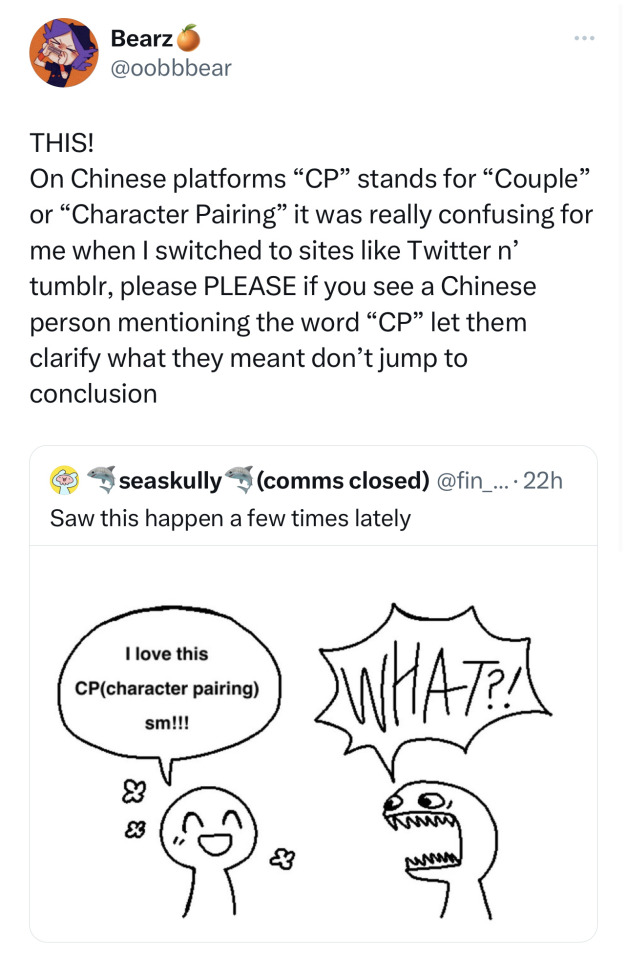
Please understand that there are cultural differences and language differences, if you see this happening let the person clarify what they meant, that person might just not be familiar with words the western side of the internet use
#bearz rambling tag#no it’s not really possible to let everyone who uses this term to change#because as far as I know this is the most common word with use on Chinese websites#I didn’t know that pairing are called ‘ship’ here#like why would I even know that#‘ship’ makes zero sense to me#it took me a while to learn the fandom language people speak here#it’s hard#give people time#shipping culture is very different too#Like on Chinese site you HAVE to clarify the Top and the Bottom of this ship in the ship name#it is very very important to them#people who like the same ship but with different Top Bottom preference will fight till no end#imagine how confused I was when I first got here#where there’s no top bottom differences#it’s not really a smut thing#it’s more a dynamic thing#AxB and BxA is very different#oh I can talk so much about the differences on fandom cultures#if ya are interested in more please feel free to ask#it’s very interesting to me#I wanna talk about it
10K notes
·
View notes
Text
https://www.namastemandarin.com/
The Chinese program offers Mandarin Chinesecourses at all proficiency levels. Students will develop Chinese language skills and transcultural understanding that enables them to interact with Chinese language users in a linguistically correct and socially appropriate manner. Instructional materials and communicative activities are carefully integrated with grammar structures to help students learn the language form with connections to meaning and function. Instruction is learner-centered, communication-oriented and task-based.
#Best Language Learning In Bengaluru#Learning Chinese Language#Best Chinese Online Course#Foreign Language Classes Near Me
1 note
·
View note
Text
(Languages taken from the top 10 foreign languages learned on Duolingo in 2024.)
I would like to bring your attention to two fundraisers that are near and dear to my heart.
@elhamhamdan-gaza is a young woman trying to survive in Gaza with her family. She was a top student at university until October 2023, when she and her family were displaced from their home in Khan Younis and forced to flee to Rafah. After the invasion in Rafah, they returned to their home in Khan Younis only to find it burned. They had no choice but to live in it. Elham and her family desperately need funds for blankets and clothes, because winter is here and nights in Gaza are very cold right now.
Elham's campaign is very low on funds! So far they have only been able to raise £594 and they desperately need more support. Please donate to them if you are able, and share this post and campaign with as many people as you can.
This campaign was verified by the Butterfly Effect Project (instagram) and is number 1180 on their spreadsheet, which you can access through the link on their instagram profile.
You can contribute to Elham's campaign by clicking on the link below:
Secondly, @drdarine is a young woman who is a medical student in Gaza. Despite being displaced and suffering hardships we can only imagine, Darine is continuing her studies and helping out others in the refugee camps and shelters in southern Gaza. Her family consists of seven people, one of them being my friend @dawoudi who is selflessly and unfailingly helping many other families in Gaza by verifying their fundraisers and promoting them on Tumblr. Everyday I see more campaigns added that he has verified, providing an important service to the many families in Gaza that need our help.
Darine's family has been fundraising since February, which is almost ten months! Despite that, they have only been able to raise $5,765, 19% of their goal. Progress on their campaign is extremely slow, often needing to wait multiple days for another donation to come in. We can do better than that.
This campaign was vetted by @gazavetters, and is number 15 on their spreadsheet, which you can find in the pinned post on their profile.
You can contribute to Darine's campaign by clicking on the link below:
Please support these fundraisers! Thank you!
Tagging for reach, let me know if you want me not to tag you in the future
@commissions4aid-international @funds4gaza @a-shade-of-blue @dlxxv-vetted-donations @kyra45-helping-others
@northgazaupdates2 @bilal-salah0 @imjustheretotrytohelp @devilofthepit @ankle-beez
@lukewarm-lesbian @wellwaterhysteria @appsa @qattdraws @laughteronsilverwings
@felixander-official @nabulsi @mukkie @oursapphirestars @fruitwoodmac
@comrademango @sunflowersmoths @mindchalice @battleteacake @girlinafairytale
#languages#duolingo#learning languages#learning english#learning french#learning german#learning spanish#learning Japanese#learning korean#learning italian#learning Chinese#english#spanish#french#german#japanese#korean#italian#chinese#fundraising#mutual aid#gfm#vetted fundraisers#vetted by butterflyeffect.project (instagram)#no 1180 on their spreadsheet#vetted by gazavetters#no 15 on their spreadsheet#this campaign is very low on funds!
597 notes
·
View notes
Text
Once the theatre monkey discovers angsty broadway musicals its all over y'all
or: I got a new personal project I'm workin' on! I'm at the first pass on the animatic rn! I forgot that 'generate matte' is a thing you can do in SB Pro for a whole hour!! I'm suffering!!!
#lmk#lego monkie kid#animatic#wip#storyboarding#fanart#six eared macaque#liu'er mihou#lmk macaque#shadowpeach#sun wukong is not here but he is haunting the mini-narrative#mac thinks HE's doing the haunting lol nah dude your ex-mans is living rent-free in ur cranium#I heard this song in a 'cartoon villain playlist' and only learned later it was from a play and went like:#“and i can feel bitter shadowpeach feels in this chilis tonight”#something something Denial something something river in Egypt#this is what happens when u don't talk about your feelings#POV: you're on the downward spiral but you're taking it like a waterslide#for real my favorite part of mac's character arc is where he's justifiably Bitter About It#but that won't stop him from being UNjustifiably a huge piece of work and Extremely Biased about it#it being the past events where two monkies both managed to fumble the bag in adjacent but slightly different ways#macaque ilu but u are not genre-savvy sometimes#i know mac is a chinese character BUT#he would totally spell theatre <- this way if he learned to read/write in english#i actually headcanon that his magical celestial monkey hearing would make it REALLY easy to pick up new languages but not the writing#oop i forgot: song is For The Record from 36 Questions#which I have not seen so idk how thematically relevant the og song context will be here
391 notes
·
View notes
Text
The known-ish words of intermediate Chinese, or: What does it mean to know a word?
We all have this intuition, especially in languages like Chinese, that there are words we 'kind of know'. These are the known-ish words. In the case of Chinese, most people would recognise at least three axes:
1) Do I know the meaning? 2) Do I know the pronunciation? 3) Do I know how to handwrite it?
You might answer yes to some, but no to others. Voila! You know the word - ish.
And then you can also add the dimension of passive and active knowledge:
1) Do I recognise this word passively? 2) Can I use this word actively?
Great. Even more ways of kind of but not really knowing a word. But that's far from all. There's also the different domains of listening and reading, writing and speaking.
So passively, that looks like:
1) Do I know the meaning when listening? 2) Do I know the meaning when reading? 3) Do I know the pronunciation when reading?
Once we add in the active dimension, it all starts to get a bit more complicated. This is far from an exhaustive list, but consider the follows ways you could define 'knowing' a word:
1) I can read the word out loud (but I don't know what it means, and I can't use it in a sentence) 2) I know what the word means, and I can use it in a sentence (but I can't handwrite it) 3) I can use the word in a spoken sentence (but I don't know how to type it, or which character it uses) 4) I can recognise the word when reading (but don't know how to read it out loud, and can only guess at the meaning) 5) I can use the word in a written sentence (but not a spoken sentence) 6) I can type the word and recognise the word (but I don't know how to handwrite it) 7) …
Okay. What else?
Chinese is a compounding language.
Have you ever had the experience that you can't recognise a character individually, but as soon as you see it in a familiar compound, you know what it means? So:
1) I can recognise the word individually 2) I can recognise the word as part of a compound 3) I can recognise the word as part of an unfamiliar compound
Chinese is also a language with a long and storied tradition of writing in Classical Chinese as a literary language and a lingua franca across the whole of East Asia - even two hundred years ago, people were writing in Literary Chinese. 'Mandarin' as a concept did not exist.
So often the meanings of familiar characters can be quite different in formal language or chengyu in the modern language, which uses more classical / literary structures and grammar.
Take, for example, the character 次. The first layer of meaning in modern Chinese - the most foundational layer - is its meaning as time, like 'I have been to Ghana two times'.
But its second layer of meaning is secondary, or next best, or just next. For example:
1) 次货 - substandard goods 2) 次子 - second son 3) 次年 - next year
And so on. Many common words have this kind of polysemy.
So we can add another dimension:
1) I recognise this word's common meanings 2) I can use this word's common meanings 3) I recognise this word's less common meanings 4) I can use this word's less common meanings
Add in the reading and listening dimensions, and things get even messier. I am familiar enough with this basic secondary meaning of 次 to fairly quickly be able to understand that it means 'next' or 'second' rather than 'time' if I see it in a written unfamiliar compound or chengyu. But I am most definitely not quick enough to do that every single time whilst listening to the news, for example!
And what about pronunciation? Once you know a fair amount of Chinese characters, you can often guess the pronunciation of new or unfamiliar characters. How?
Because of phonetic components.
For example:
请
清
情
Notice how these all have the same component on the right? This tells us that these characters belong to the largest group of Chinese characters, phonetic-semantic characters. That is - some part of the character gives a clue to the meaning, and some part gives a clue to the pronunciation. In this case, we know they are all pronounced some variety of qing.
But it isn't always that easy. Some phonetic components tell you the tone and pronunciation - some tell you the pronunciation, but not the tone (like qing above). Some phonetic components, to go even further, are only really decipherable if you have a particular interest in phonology or historical linguistics, or learn the patterns. Consider:
脸 - lian3 (face)
险 - xian3 (dangerous)
验 - yan4 (test)
剑 - jian4 (sword)
签 - qian1 (to sign)
捡 - jian3 (to pick up)
There are far more. If you look down the whole list on Pleco, they all show a similar pattern of variation. You can see some patterns, but also numerous exceptions - most end in the -ian final, except for those that are yan of various tones. All begin with l, x, y, j, q. Most are pronounced jian3, but that is far from a rule.
All this to say - you can see a character, and know vaguely how it is pronounced. If I know that a character is pronounced qing definitely, 100%, but don't know the tone - does that mean I know the pronunciation? Or would you only say that knowing it 100% means knowing it? And in that case - how can you account for the fact that learning a character when you already know 90% of the pronunciation is significantly easier than not knowing it at all?
Let me add just a few more scenarios. Bear with me!
1) A character has more than one way to be pronounced. For this word, you read it incorrectly (but you usually know it). 2) A character has more than one tone. Some people pronounce it always with one tone, and some alternate between the two pronunciations. You only knew it with one - but you're half right? 3) You make the same mistake that a native speaker would make with tone or pronunciation of a rarer character.
In some way, these are all more knowing than not knowing anything at all.
And none of this is even taking into account different writing systems, traditional and simplified.
Here are some more scenarios:
I recognise the character in traditional (but not simplified)
I can type the character in both, but I can only hand-write in simplified
I know the Taiwanese pronunciation, but not the Chinese
etc
And of course Chinese characters are used across multiple different languages.
So you could conceivably have these kinds of situations:
I know the pronunciation and meaning in Cantonese and Mandarin
I know the pronunciation and meaning in Cantonese, and the meaning in Mandarin
I know the pronunciation and meaning in Mandarin and recognise it in Cantonese, but know it means something different
I know the pronunciation in Mandarin, but don't know what the whole word actually means in Mongolian (Chinese characters used to transliterate Mongolian words)
Plus there's handwriting and calligraphy!
Personally, I can't read a lot of calligraphy and have accepted my happy illiteracy in many styles. All Chinese learners and heritage speakers know the feeling of sitting in a Chinese restaurant or museum and having a well-meaning friend say, 'Oooo, what does that say?' It's depressing! So let's add some more nuances to our known-ish characters:
I can read this character in common fonts
I can read this character in less common fonts
I can read this character when handwritten
I can read this character when handwritten quickly / by a child / by a doctor
I can read this character in grass script / seal script / etc
Then there's the question of naturalness.
I frequently add words to my Anki decks that I would be able to understand, no question, if I were reading or listening - but I probably wouldn't have thought to say it in that way. So:
I recognise this word, and would have said it exactly like this
I recognise this word, but would never have thought to say it like this
I can use this word, but didn't know you could use it in such a metaphorical way
I can use this word in a metaphorical way, but didn't realise it corresponded so closely to English / was so different from English in its meaning
And finally there's the simple question of memory.
I know I've seen this word before, but I can't remember it right now and I want to drown myself pathetically in the vast uncaring sea
I know I used to be able to use this word actively, but now can only use it passively
I can still type it, but have forgotten how to handwrite it
I can still use it in writing, but I wouldn't be able to use it in speaking
I can recognise it in set expressions, but wouldn't remember how to use it on its own
I can remember the simplified character, but not the traditional
…
So how many ways do you know a word?
I often feel embarrassed to post my vocabulary lists, because I feel that people will be surprised that I don't 'know' certain more foundational words. I think they will be confused as to why I have very 'advanced' vocabulary alongside 'simple' vocabulary. I feel a lot of pressure to be 'advanced' because of the amount of followers I have, but there's a lot of more basic characters I still don't fully know in a holistic way.
And the truth is that all of those characters and words are in Anki for different reasons. I might have a vocab list that looks like this:
略
松懈
星光
缕缕
薄雾
博览
I don't know any of these words in exactly the same dimensions as I know the others! Let's look at my reasons for including each in detail.
略 - lve4 - slightly. I have this word here because although I know it well in set expressions like 略有耳闻 'have heard a little about',略有受损 'has suffered slight losses' etc, I wouldn't remember the pronunciation if I saw it alone or with another verb apart from 有. I would still know the meaning - but I wouldn't remember how to pronounce it. So even though I 'know' this word, it's still there in Anki.
松懈 - song1xie4 - to relax, lax, slacken. This is a rare example of a totally 'new' word - most of my Anki words aren't. I know 松 already well, but have never seen the character 懈 before: I didn't know its meaning, or pronunciation.
星光 - xing1guang1 - starlight. I know both characters, pronunciation and meaning, and I can easily understand this word. I just never would have thought to say it so simply. I want to use it actively, so I put it in Anki.
缕缕 - lv3lv3 - fine and continuous (i.e. rain, drizzle). I know 缕 already on its own as a measure word for sunlight, thin hair, gossamer, mist, smoke, fine threads etc - I often forget its pronunciation, but I know its meaning reliably when reading. But together the compound 缕缕's meaning isn't quite extricable from just knowing 缕, so I put it in here.
薄雾 - bo2wu4 - mist, fog. I know 雾 well, but hadn't come across 薄 before (or wasn't sure if I had or not). This is an example where I knew its pronunciation, because of phonetic components, but I didn't know the meaning of the character.
博览 - bo2lan3 - to read widely. I know this word very well. So why is this in there? Literally just because I remembered the pronunciation and meaning of 博览, and when I was racking my brains trying to see if I knew the 薄 in 薄雾, I thought it might be the same character. I looked it up, and it wasn't. So even though I know the word, the meaning and the pronunciation, I had to put it in - because I didn't remember which character was used for the bo2.
When you acknowledge all of the different ways of knowing a Chinese character, it makes sense that your learning after the beginning level is going to be full predominantly of known-ish words.
Accept this! Form your own relationship to it! For me, a huge part in my motivation to return to learning Chinese after a year-long break was just to accept that I was likely never going to 'fully know' most of the characters and words that I partially know.
But that's okay. Think about your native language.
If your native language is English or you speak it very well, consider a word like monadic. Could you say you knew this word? Fully knew it? Like me (I learnt this word in the context of Linguistics yesterday), you might have an idea that it has something to do with one - mono, monorail, monotropism, monologue, monolithic etc. But would you be able to use it in a sentence? Would you be able to explain it to a child?
Or let's say you're learning two new English words: lithology and dreich. (The latter is a Scots word, not English - you would hear it in Scotland frequently.) Neither word you completely know. Which one is going to take you longer to learn?
It's likely going to be lithology. You can form connections with words like monolith or paleothic or maybe even lithium - even if you couldn't say for sure what the Greek element lith means, you're passingly familiar with other words containing it. You also know -ology, and you know how to pronounce the word. If you learn that it means 'the study of rocks', that is probably quite easy to remember.
Dreich, on the other hand - what is there to tell you a) how to pronounce this, or b) that it means 'dreary' or 'bleak', as in, dreary weather? You can't form any connections with similar words at all, and the [x] sound at the end - like in German or Hebrew - might be unexpected to hear if you don't live in Scotland.
That's what Chinese is like in the beginning. All words are like dreich. But the more you learn, the more words begin to be like monadic or lithology.
Learning ten new words a day like dreich would be very difficult. But if you've seen monadic a few times over the last few months, know vaguely when to use it, know how to pronounce it - it's not so hard to imagine that you could learn ten of those a day.
I find all these known-ish words very overwhelming.
And I also find recognising the potential for overwhelm in the Chinese language - because of its unique properties - very helpful in letting me feel less guilty about my current known-ish words. I do know them - ish.
But when I finally get around to properly learning them, all that ish-ness will make them that much easier to remember!
Now I try not to stress out about these types of words. I recognise that, in many ways, they are inevitable. Unless you're a poet who composes out of thin air, you're not going to ever say a literary word for emerald green as frequently as you'll read it in descriptive passages in novels.
It's natural to know certain words in a spiky profile: to know them very well in some ways, but not at all in other ways.
The more you read, the more pronounced this can become.
So here's what I've learnt, and here's the message of all this big, long, rambling post:
Putting 'easy' words that you feel you should know into Anki isn't regressing. It's adding another dimension of knowledge to your understanding of the word. You shouldn't feel ashamed or frustrated when you find you don't know one aspect of an otherwise 'easy' word. I'm still trying to learn this.
Because -
Having lots of known-ish words is not a unique failing on your part. It's a reflection of Chinese as a language and its unique complexity -
And it's part of what makes it so uniquely beautiful.
Have a nice day, everyone. meichenxi out!
#chinese#mandarin#learn chinese#chinese langblr#langblr#chinese tips#language learning tips#mandarin langblr#god i struggle so much with these words but. we proceed. we continue
289 notes
·
View notes
Text
language learning is such a personal thing that there is no “right” or “wrong” way of doing it. it’s whatever works on bringing YOU closer to YOUR goal.
you want to watch tv shows but don’t really care for speaking with others? yay!! no speaking practice needed.
you want to learn quickly for an upcoming trip? yay! text book phrases and simple grammar.
you’re a beginner and it’s been 10 years? 2 weeks? 6 months? it doesn’t matter. as long as you are working towards bringing YOURSELF closer to what YOU want to achieve, you have succeeded: you are succeeding; you are doing great.
i find that so much demotivation comes from comparison and/or trying to follow other's advice too closely. if anki decks don't work for you, that's fine! if duolingo works well for you, then use it!
this language learning thing, it should be enjoyed. in the sea full of deceptive polyglot stories and videos on top of videos attempting to understand how to learn languages in "the fastest way possible" sometimes we should sit back and ask ourselves, "when is just learning things, enough"?
with that i hope you all continue working towards your dreams! whether you want to become a translator or just watch a few more movies in your target language, you can do it. i know you have it in you.
#langblr#studyspo#language#languages#language learning#learn chinese#learn french#learn german#learn korean#polyglot
2K notes
·
View notes
Text
How to Actually Learn a Language (Without Wasting Time)
Polyglots will do anything to sell you something, so here’s the fastest and most basic technique based on my research.
—
Step 1 – Getting the Absolute Basics In
This is where most people already get lost. If you search social media for how to start, the advice isn’t necessarily bad, but it often makes you dependent on a single resource, usually an app that will eventually try to charge you. Duolingo, for example, has turned into a mega-corporation that perfected gamification to keep you on the app.
Remember: free apps make money by keeping you on their platform, not by helping you become fluent.
At this stage, the goal is not to gain conversational skills but to avoid overwhelming yourself and get a feel for what you’re actually getting into. All my recommended resources are free because I believe learning a language should be a basic right. I wouldn’t advise spending any money until you’re sure you’ll stick with it. Otherwise, it can turn into a toxic “but I paid for this, so I have to keep going” mindset that drains all the fun out of learning.
• Language Transfer – Highly recommended for Spanish, Arabic, Turkish, German, Greek, Italian, Swahili, and French.
• Textbooks – Simply search for [language] textbook PDF, or check LibGen and the Internet Archive. Don’t overthink which book to choose—it doesn’t matter much.
• Podcasts – Coffee Break is a solid choice for many languages.
• YouTube Channels – Join r/Learn[language] on Reddit and find recommendations.
—
Step 2 – The 20/80 Principle
The idea is that 20% of words make up 80% of everyday speech.
What you’re going to do:
Search “Most common words [language] PDF”.
This list is now your best friend
For flashcards, I highly recommend AnkiPro. It lets you import pre-made lists for Anki/Quizlet and has an archive where you’ll definitely find the most common words. But it lacks audio. The real Anki program has it, but only on PC (unless you’re willing to pay $30 for the mobile app). Use AnkiPro for now—we’ll come back to repeating phrases later. In the meantime, find a YouTube video with the most common words pronounced, or use Google Translate for audio.
(Knowt is a free alternative for Quizlet if you prefer that)
These lists will spare you from learning unnecessary vocabulary at this stage. Spaced repetition (which Anki uses) can take longer, but it’s worth it because you want these words to stick. Anki will only introduce a small number of new words per day. Once you start new words, write phrases using them. Doesn’t matter if they’re random just try to use them.
—
Step 3 – The First Breakup With the Language
This isn’t really a step, but I have to mention it. For me (and for other language learners I’ve talked to) this is where motivation crashes.
The dopamine rush is over. Your ego boost is gone. You’re stuck understanding just enough to notice how much you don’t understand, and topics are getting more complex. Everything feels overwhelming, and motivation drops.
This is normal. You have to push through it.
I’ll write a separate post on how I manage this phase, but for now:
• Take a step back and make sure you understand the basics.
• Find something that keeps you motivated.
• Consistency is key. Even if it’s just five minutes a day, do it. (Edit: You can search online for inspiration on scheduled plans. I found one that organizes language exercises into different categories based on how much time you have each day, which seems helpful. https://www.reddit.com/r/languagelearning/s/sSGUtORurM
Personally, I used AI to create a weekly plan kind of as a last resort before giving up on the language, but try looking for pre-made ones first.)
I personally enjoyed story learning during this phase. And don’t forget the frequency lists are still your best friend. For story learning check out Olly Richards books!
—
Step 4 – Immersion
Your brain needs active and passive immersion. The earlier steps were mostly active, and now you’ll start the fun part.
How to Immerse Yourself:
1. Join some kind of community.
• I enjoy Reddit/ r/lean[Language]. Do this in your target language, but also in the language you already speak. Post that you’re looking for a chat partner in your target language. The most people are nice, and the mean ones will just ghost you anyway.
2. Watch shows.
• Subtitles only in your target language or drop English subtitles ASAP.
3. Listen to podcasts.
4. Read
I personally dislike media made for kids (except on low-energy days). For real immersion, pick something for adults.
5. Translate, write, and speak.
Before this, you wrote simple sentences using vocabulary. Now, put them to work:
• Translate texts.
• Keep a diary.
• Write short stories.
• Complain about the language in the language.
It doesn’t matter, just use it.
—
Step 5 – Speaking
Start speaking earlier than you think you’re ready. Trust me. This is probably where most people disagree with me. I do think you should start by focusing on input, but the importance of output isn’t talked about enough.
Now, the real Anki (or any program with phrases + audio) comes into play. At lower levels, it doesn’t make sense to just start talking, since you wouldn’t even be able to recognize your mistakes. Here’s what you’ll do:
1. Repeat phrases out loud.
2. Record yourself speaking.
3. Compare your recording to the original audio and adjust your pronunciation.
If it’s a tonal language (or if you struggle with accents), start this even earlier.
Other Speaking Strategies:
• Shadowing – Repeat after native speakers.
• Reading aloud – Your own texts, books, anything.
• Talking to yourself.
• Talking to natives (if you’re brave).
I’m not here to fix social anxiety, but I am here to help with language learning, so just speak.
—
Final Thoughts
• These steps overlap, and that’s fine.
• This is supposed to be fun. Learning just because you’re “too deep in” or because of school won’t cut it.
• If you’re lost, take a step back.
• I’m not a professional. I just think a straight answer is way too hard to find.
—
If you have anything to add, feel free to share.
#esperanto#linguistics#language nerd#polyglot#langblr#foreign languages#languages#language learning#chinese#french#language#learnlanguages#learn english#learnesperanto#learning#learn japanese#learnandgrow#learn french#learnnewskills#i dont know what to write
194 notes
·
View notes
Text
Look, I knew five languages by age 19 and now I am learning like 3 more. I work as a language instructor and a consultant. If I can give language learners only one advice, this is it.
STOP LEARNING WORDS ON THEIR OWN.
You're doing yourself a disservice by learning lists of "30 words you must know!" "100 most common words!" like it literally means nothing if you cannot use those words in an appropriate context with proper grammar. So what you actually need to do is learn those words via example sentences.
Of course, sentences have more words so you may think you're learning less but you're actually learning the way to use it in context. That's what's important.
Language is about communication, which also means if you want to learn languages, you have to observe how people communicate with each other universally. Native speakers never have a list of words they know and they don't count every single new word they've learned. So why are you doing it to yourself? What native speakers do is listen to the new word, remember the context they're spoken in, and keep using that word in that context. And that's why people go "wait, you can use that word LIKE THAT?" all the time. So you, a language learner, are also allowed to do that. I'm not even saying those word lists are useless but they're the most useful AFTER you've known most of them and are trying to go over them for practice etc. Native speakers do click on those word lists to check out how many words they don't know or to remind themselves of those words or to learn some facts about each word. That should be your goal as well.
Learn sentences. Learn them in context. Do not fall into the "I must know xx amount of words or I'm a failure at language learning" trap perpetuated by bloggers or youtubers or whatever. Have fun with it!
#language learning#studyblr#langblr#100 days of productivity#chinese studyblr#japanese studyblr#korean studyblr#how to learn#learning#academia#academic#academics#language study#language#languages#study tip#study#study motivation
987 notes
·
View notes
Text

These are the apps and links I currently have on my phone to study Chinese:
SuperChinese: my main study resource. There are currently 7 levels, level 7 (still incomplete, they are still slowly adding lessons to it) being HSK 5 stuff. Each lesson has vocabulary, grammar and a short dialogue where those are used in context (I love context). It has a few free lessons in the lower levels but after that you have to buy a subscription. There are many sales though. When I was a beginner I used HelloChinese instead, which has more free content, and switched to SuperChinese when I finished all the free content there. It also has social network features and chat rooms I don't use.
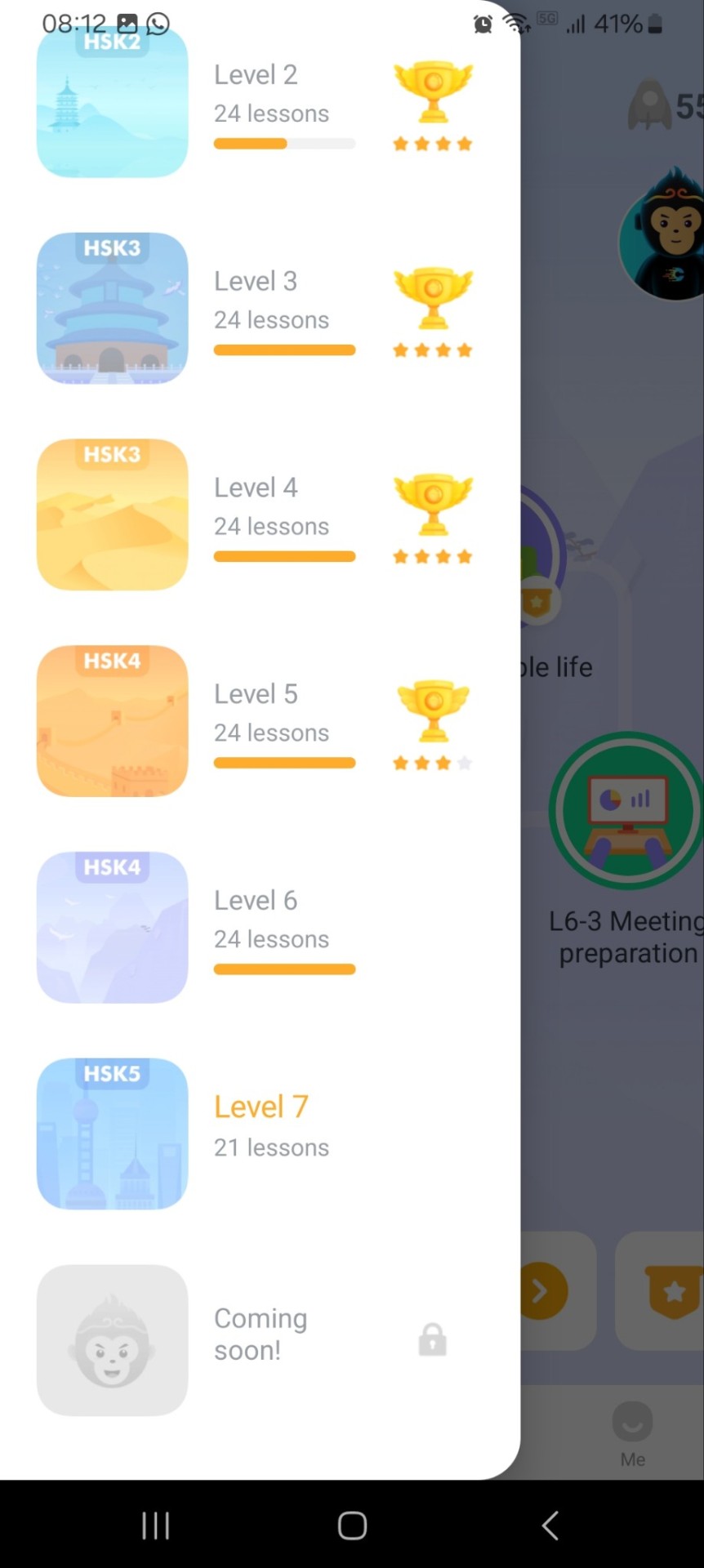
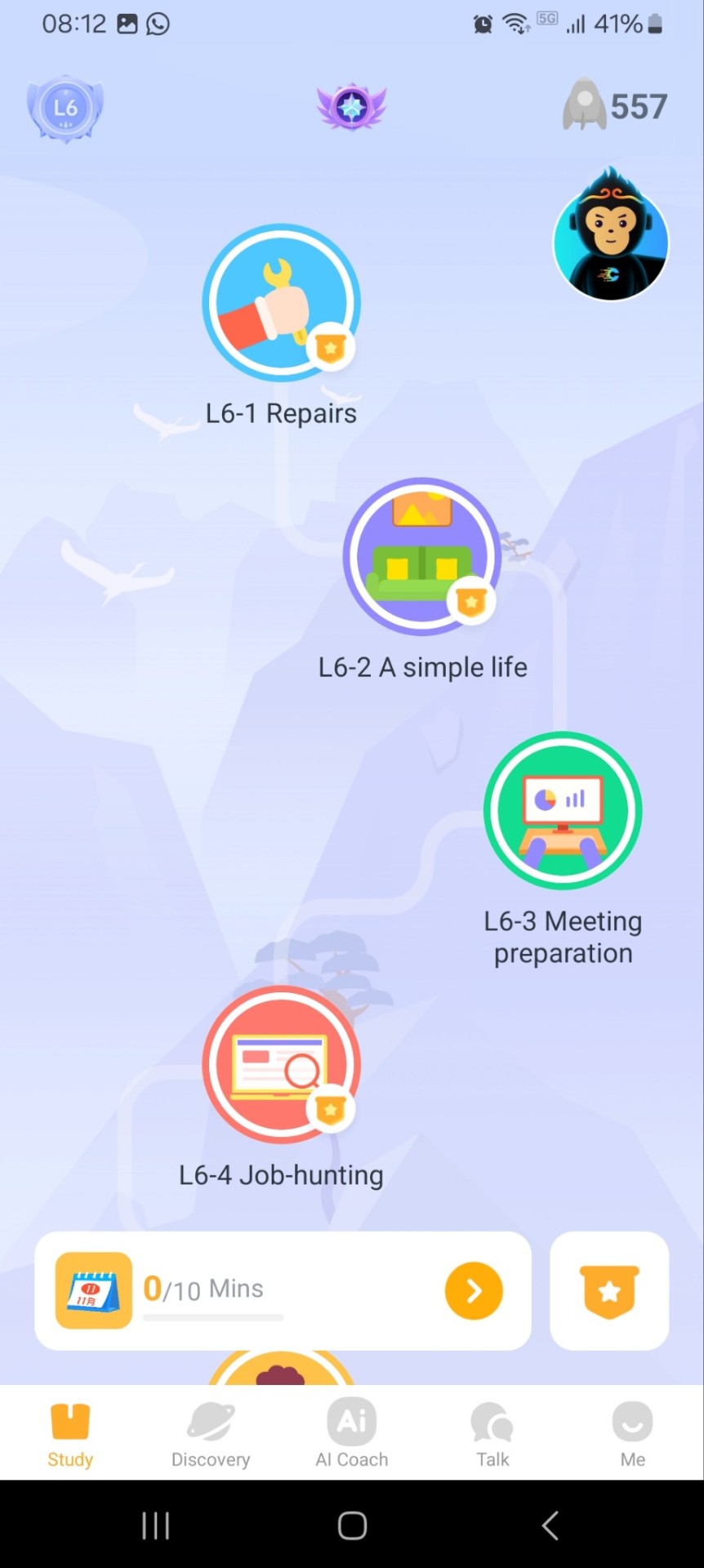
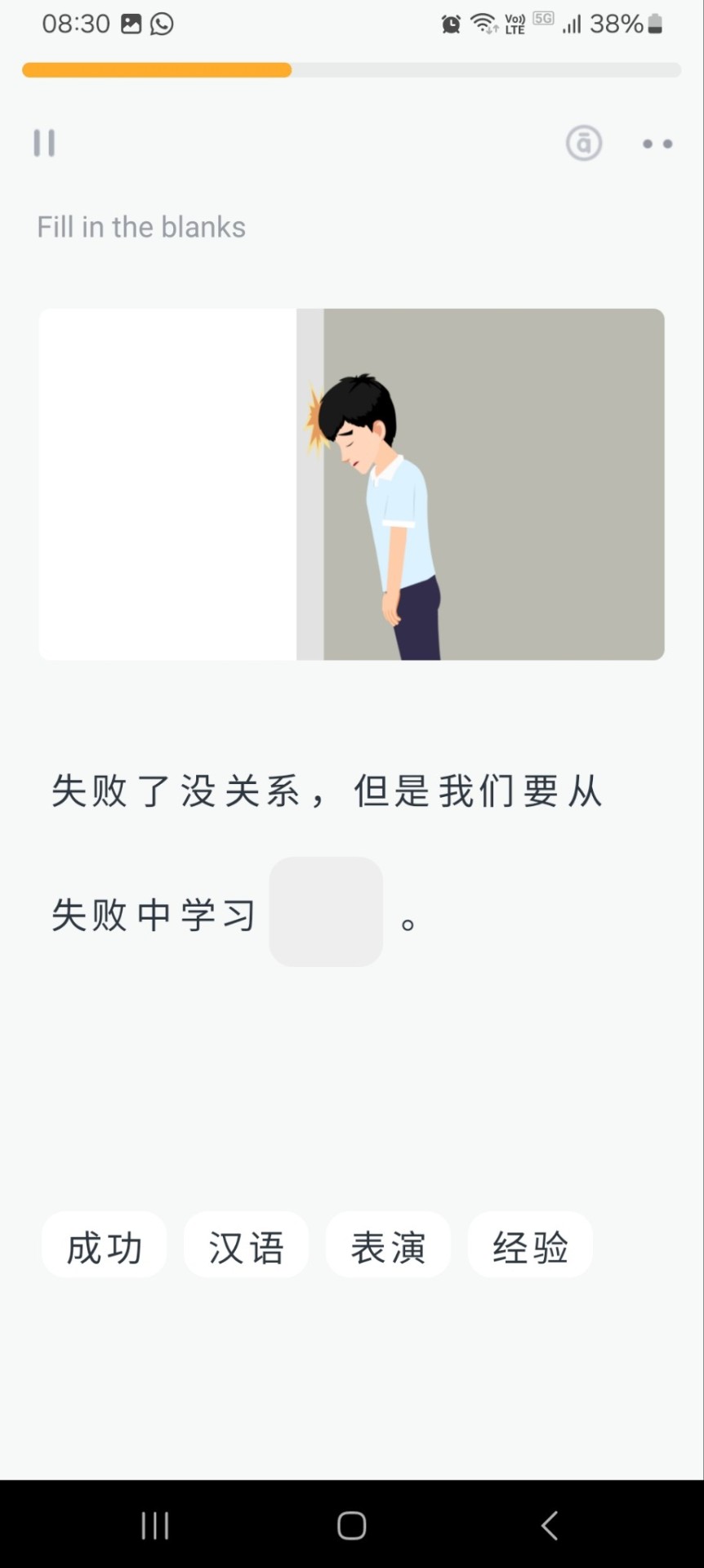

TofuLearn is like a flashcard app with many pre-made decks (you can also create your own on their website and import decks from Anki) and the option to practice writing hanzi. Anki didn't work for me, but I find Tofu very helpful. Practicing writing helps me with character recognition, and it also helps me remember the tones thanks to the audio in the pre-made HSK decks.
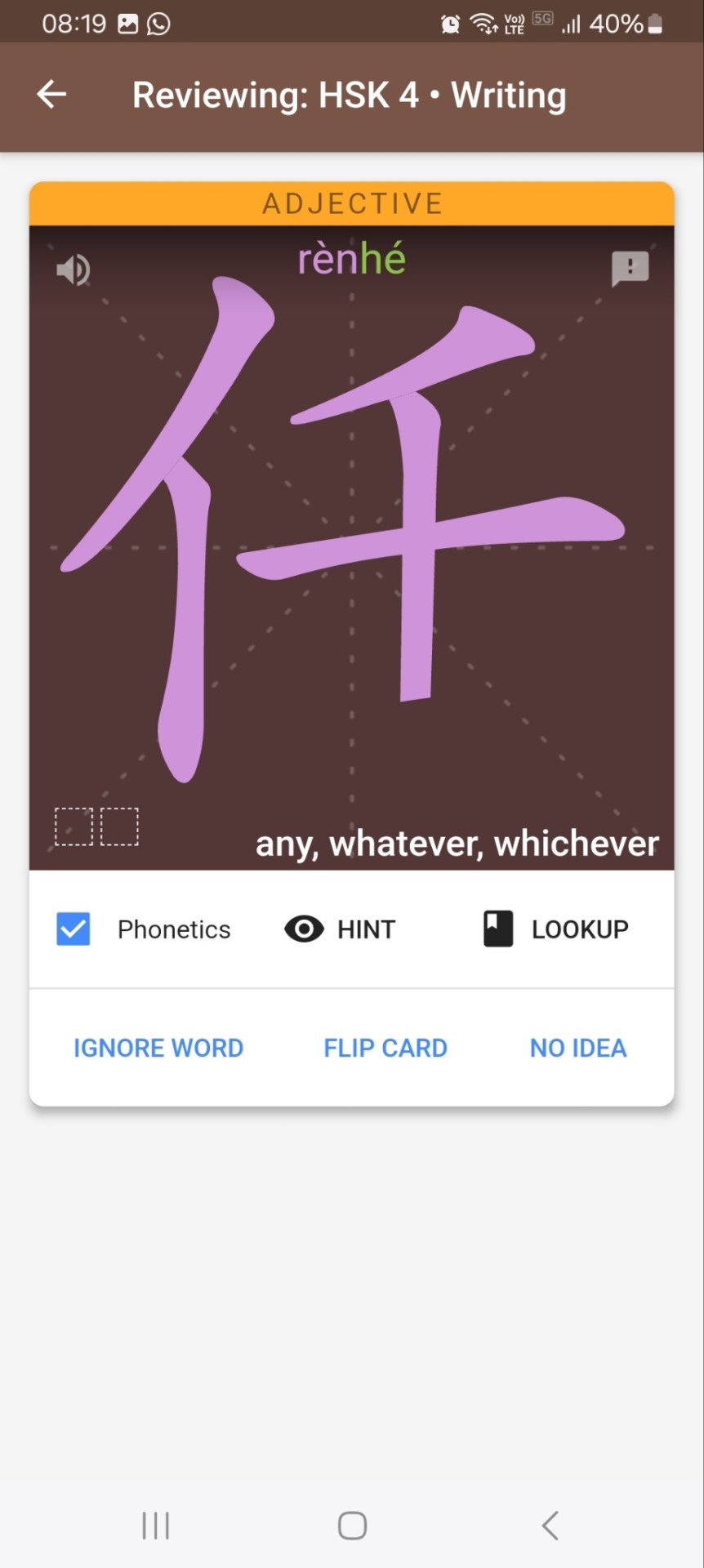
Dot is a reading app with new texts being added every day. It used to be completely free, which actually seemed too good to be true, and then they put practically everything behind a paywall and very strict limits for free users. After a couple of months they made it a little less restricted though - we still can't choose the articles but we can read as many as we want as long as we do the vocabulary exercises after each article (plus, during the Spring Festival, they made all articles available for free for 3 days and we could save the ones we were interested in to read later). It follows the new, not-yet-implemented (and harder) HSK levels, so you should start one or two levels below yours and if the texts are too easy move up.
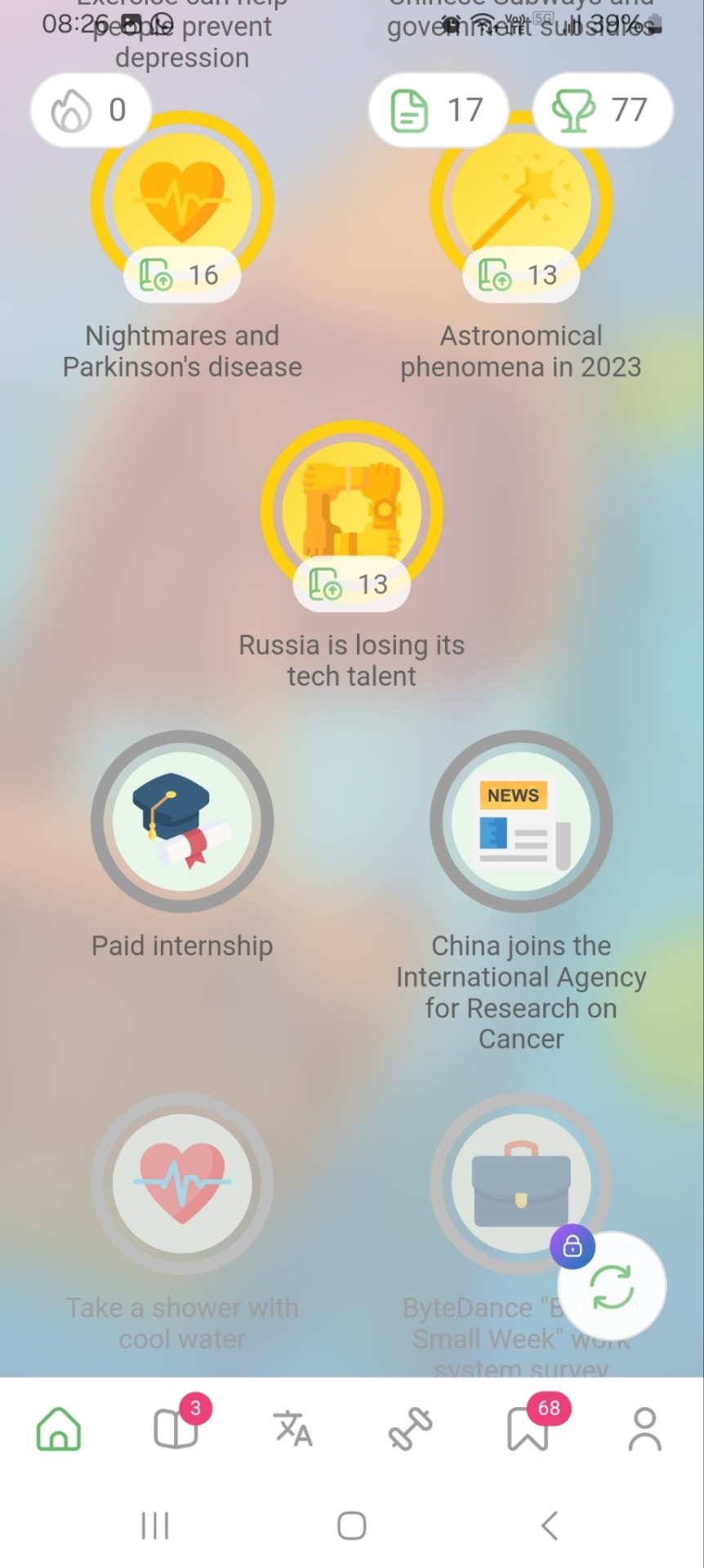
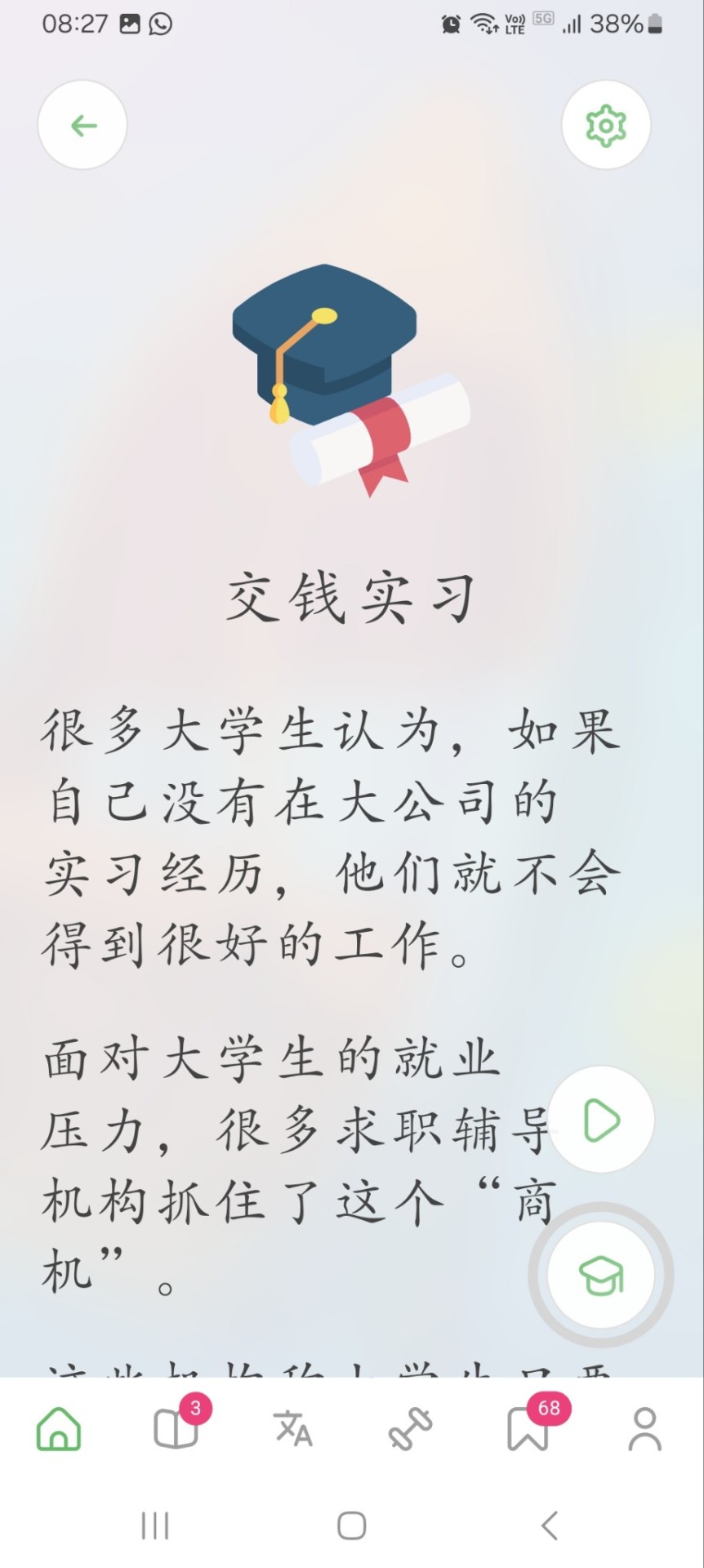
Google Translator: not the best but helpful when I need to translate whole sentences, plus I can point my camera or open an image and it translates writing.
Pleco: best Chinese to English dictionary.
Stroke Order: not an app but a website, does what it says in the tin: shows stroke order for a specific character.
YouGlish: also a website, you can put a word or phrase and it shows videos where people say that word/phrase. Very cool.
Todaii is a graded news app that has only two levels: easy and hard. I'm around level HSK4 and the "easy" level is quite hard though (but I admit reading is my nemesis).
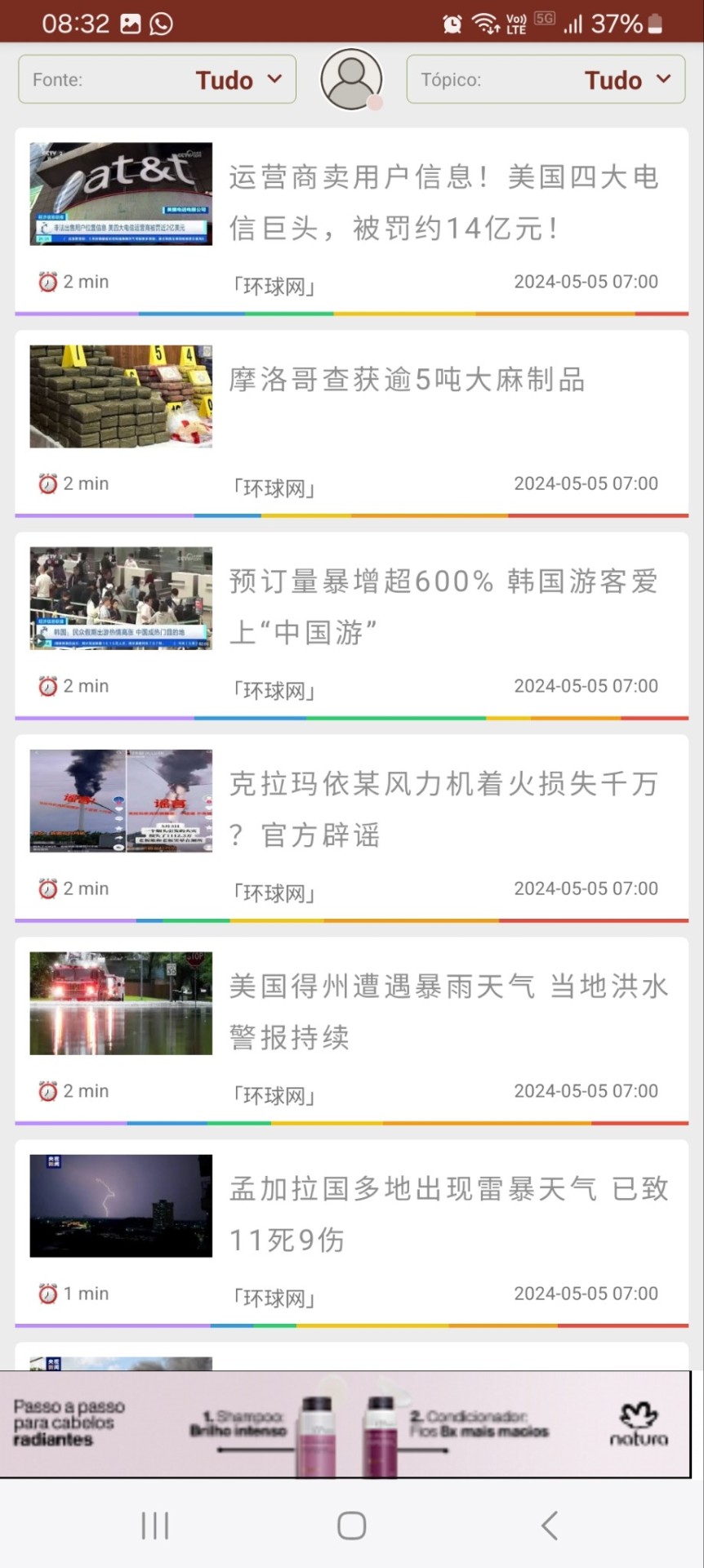
I also use YouTube and Spotify a lot.
#personal#resources#langblr#language learning#learning chinese#chinese langblr#chinese language#mandarin#中文
599 notes
·
View notes
Text
Let's learn pinyin!
#xiaohongshu#xiaohongshu for you#rednote#xhs#best of xhs#china#chinese#best of rednote#best of xiaohongshu#language practice#chinese language#language learning#language#pinyin#pronounciation
104 notes
·
View notes
Text
The 然's
突然,虽然,忽然. and the other 然's can often get mixed up, so here's a quick explanation of some of the most common ones!
突然 (Túrán): This means suddenly or unexpectedly
居然 (Jūrán): This kind of means suddenly, but more in the sense of "surprisingly" or to suggest disbelief at something that happened.
忽然 (Hūrán): This also means suddenly or unexpectedly, but it has a more stronger connotation.
既然 (Jìrán): This is a conjunction meaning "since" or "now that"
既然the weather is great, let's go out!
既然 you aren't busy, let's go watch a movie.
不然 (Bùrán): This means "otherwise" or "or else";
You should study, 不然 you won't do well on the exam.
虽然 (Suīrán): This means although or even though.
虽然 I'm not good at singing, I still like to go to the karaoke.
当然 (Dāngrán): 当然 means certainly or definitely and can be used as a reply:
Can you help me with A? 当然!
自然 (Zìrán): This can mean nature or naturally.
China's 自然 is very beautiful.
She speaks Chinese 得很自然.
仍然 (Réngrán): This can mean "still" or "yet".
I仍然 haven't read that book.
依然 (Yīrán): Similar to 仍然, this also means still" or "yet" but it's usually used in more formal and literary works, whereas 仍然 is more often used in spoken language.
果然 (Guǒrán): 果然 can be used to mean "indeed" or "as expected"
This movie is 果然 interesting.
竟然 (Jìngrán): This is an adverb used to suggest surprise or something unexpected.
He竟然forgot her birthday.
显然 (Xiǎnrán): This means "clearly" or "obviously".
This soup 显然 hot.
偶然 (Ǒurán): This means "accidentally" or "by chance".
We 偶然 met at the same cafe.
How many other 然's do you know about? Drop a comment!
#slavic roots western mind#student life#student#study blog#college#college life#travel blog#aesthetic#studyblr#study motivation#chinese#china#study in china#life in china#learn chinese#chinese grammar#grammar#vocabulary#chinese vocabulary#chinese verbs#verbs#verb#chinese studyblr#mandarin langblr#mandarin#mandarin chinese#chinese language#language learning#chinese langblr#language resources
474 notes
·
View notes
Text
On Sampo's name (ALL of his names!)
I feel like everyone who's a fan knows the meaning of Sampo's full name by now- the sampo was a legendary item that could magically make endless supplies of gold, flour, and salt, all priceless items at the time! So it works perfectly for a scammer businessman like Sampo. ☆
"Koski" is the Finnish word for "water rapids" which might seem kinda random but actually makes sense for him, since Aha and the Masked Fools are also referred to with water terms:


This kind of analogy isn't specific to only Aha and the Masked Fools, but it does still tie them together. So water rapids fits perfectly! Sampo wants to stir the pot! He likes to shake things around and spice things up! He's taking that stagnant pool and turning it into water rapids! It would actually explain his ridiculous hair color, too; a dark blue wave tipped with white foam haha
EDIT: an amazing contribution from @ricochetlovebombs, who heard it from hoyolab user Rattaboy. If you interpret his first and last name together, instead of separately like I did, you would get something like "money river."
In other words, Sampo's name literally means CASH FLOW SKXJMDMDMD
What I really wanted to talk about is his drag alias name, though, Brughel Poisson, because to me that's where it gets really interesting.
So like in the English version, Sampo goes by Brughel Poisson when he's in disguise. Searching for just "Brughel" itself doesn't seem to get you much at first: a Flemish and Dutch Renaissance painter named Pieter Brueghel the Elder, who was famous for his landscapes and peasant scenery, especially Hunters in the Snow and The Blue Cloak.
He's referred to as "the Elder" because he had a son also named Pieter Brueghel (the Younger), and he began a long line of painters, all named Brueghel. Some of them did original work, and many of them created reproductions of the Elder's art to sell. The Elder was also famous as a printmaker. All of this is hilarious when you remember that Sampo is an infamous counterfeiter and has sold a relic called the Parallel Universe Printer JSKZJSMD

There is also something called Brueghel's Syndrome, named after one of Brueghel's paintings called De Gaper, which pictured a man yawning widely. It's a condition that causes the mouth to open and gape uncontrollably, twisting a person's countenance into a distorted mask of their usual face.

Tumblr doesn't have a way of censoring pics like twitter, so for the sake of the medically squeamish, I'm just showing De Gaper here. But if you look up Brueghel's Syndrome, you can find pictures of actual patients, some of whom really do make faces resembling Aha's comedy and tragedy masks!
In the Chinese and Japanese versions, his alias last name is a lot more silly- In those, "Sampo" is phonetically written as "san-bo" and "san-po." And in disguise, his last names are phonetically written as... "Bo-san" and "Po-san." The Chinese version uses different tones, but still. This smug asshole seriously just decided to write his own name backwards and called it a day NDMKXMDMD
In the English version, Poisson itself is kind of a reused Hoyo asset- it's also the name of Navia's fishing village in Genshin Impact. Which is a really silly name for a village, because it literally just means "fish" in French smzjxkdkdk but!
Again, more water imagery. And in English, if something is suspicious, we say that it's "fishy," which is perhaps the most fitting association yet for someone as shady as Sampo ☆
And for a good while I thought that was the only connection. But then. My beloved @hydrachea, who is an actual native French speaker, dropped this on me right after April Fool's Day:

Poisson is literally the word you use to pull an April Fool's prank.
#honkai star rail#sampo koski#brughel poisson#hsr sampo#hsr sampo koski#hsr#I feel like I should note that all the info on the CN/JP versions are things I know secondhand#it was posted in a server where there ARE actual people who can read/speak Chinese and Japanese and no one corrected it-#-so I'm assuming it's at least decently legit. but if it's in any way incorrect I would love to hear from others!#I'm especially interested in CN since it's the original. and I've never heard anything about 'Brughel' in any other languages.#so anyone else with fun tidbits about Sampo's name in LITERALLY ANY LANGUAGE please feel free to reblog/tag/askbox me that shit#I love learning stuff like that it's so fun ♡#fun story in the old myth the sampo was lost in the sea. and in genshin impact the village Poisson was flooded by the sea.#not only that but Brueghel's last painting- which was unfinished due to his early death- was titled The Storm at Sea.#something something foreshadowing-
341 notes
·
View notes